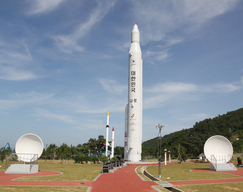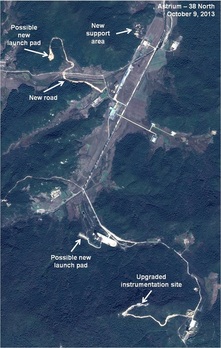|
by Katie Han '17 
Don't you just love the solar system? [image via]
Space is fascinating. Every child is bound to fall in love with the idea of flying on a sleek rocket to journey away from Earth. And at at least one reflective point as a teenager, that child will probably ponder the insignificance of human beings in this vast, endless universe filled with myriads of galaxies and will realize that we are essentially “specks.” Inspired by this sense of wonder, some will carry this passion into their careers, traveling out to space themselves, or building rockets and robots that do so. One of the leading space agencies in the world, the National Aeronautics and Space Administration (NASA) currently has over 150 missions that range from monitoring Earth via satellites, sending humans to space, studying other planets in the solar system, and exploring the universe. The technology for launching rockets is developing dramatically over the years, yet sharing of such information between countries has always been sensitive. Affluent, developed countries often join the competitive “space race” to show off their scientific advancement, while the unspoken race for power has aroused a deep fear of application of this knowledge for military purposes.  South Korea's Naro rocket launcher. [image via] South Korea's Naro rocket launcher. [image via] Thus the levels of development in space technology vary substantially between different countries. Here’s a twist: North Korea, an anti-capitalist country closed off from the rest of the world, where people reportedly “eat grass” in order to survive in poverty, is 10 years ahead of its twin, South Korea, home of the world’s largest information technology company, Samsung. Rockets are designed to have multiple stages during which they shed used fuel carriages in order to reduce weight. South Korea’s first space vehicle Naro, launched successfully this year, was a two-stage rocket with a booster built by Russia, while North Korea’s Unha vehicle from last year was a three-stage rocket with 120 tons of thrust.  North Korea's satellite launching station. [image via] North Korea's satellite launching station. [image via] On second thought, however, it all makes sense. The North Korean government has invested vast amounts of money in space technology for the purpose of delivering nuclear warheads. In fact, on October 28, the blog 38 North by the Johns Hopkins University School of Advanced International Studies reported signs of renewed construction at the Sohae Satellite Launching Station. Such news always stirs up concern in American citizens, especially those with family or friends living in South Korea. These international threats, however unlikely it is that they will come to fruition, cause many people great anxiety. Evidently, modern science is being used in the most “wrong” way possible, creating dangerous situations around the globe. The never-ending question of morality comes into play here: in this fast-paced, changing world, how can we ensure that we make ethical choices and refrain from abusing the power that science gives us? Should we continue to fulfill our desire to explore the universe despite the potential risk of arming unstable states? Surely, effective policy making would be able to prevent immediate danger. Worldwide organizations such as the United Nations (UN) must find a way to enforce ethical rules for technological development without tension, especially in totalitarian countries such as North Korea. People’s safety is and always will be a more urgent matter than political conflicts, and ultimately, science must stay in control for world peace to follow.
0 Comments
Leave a Reply. |
